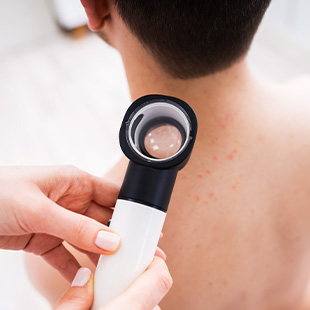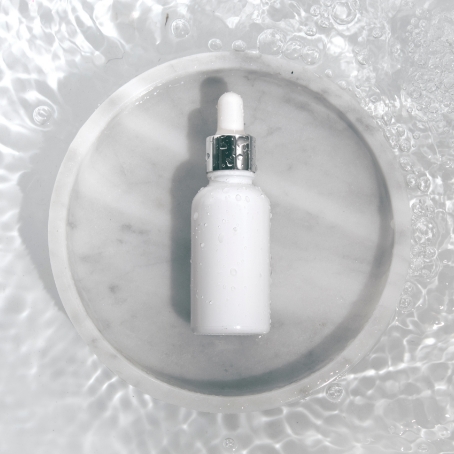On this page


What is Psoriasis?
Psoriasis is a chronic skin condition that causes scaly, red patches to emerge on the skin. These patches are sometimes called plaques. Psoriasis typically occurs in flareups triggered by different factors. During these flareups, the plaques can become very uncomfortable.
A specific type of psoriasis is called psoriatic arthritis. Psoriatic arthritis affects the joints similarly to regular arthritis. A small percentage of patients will develop this type and it often goes undiagnosed.
What Are the Symptoms of Psoriasis?
Psoriasis plaques are typically dry, scaly, flaky, bumpy, and red, similar to a rash. They are also very itchy. They are often raised above the surface of the skin, usually occurring in areas like the scalp, lower back, elbows, nails, and knees. However, they can also occur in any area of the body. Plaques can be so severe that they may crack or bleed, especially if they occur around the joints.
REAL PATIENT RESULTS
Visit our gallery to see the Biltmore Difference. We pride ourselves on consistently great results and it is our happy patients who are a true testament to our work.
VIEW BEFORE AND AFTER PHOTOS
What Causes Psoriasis?
Psoriasis is not contagious, and you cannot catch it from someone else. Instead, psoriasis is believed to be genetic and congenital, meaning you will most likely have it for life if you develop it while young. It also seems to run in immediate families, meaning you have a much higher chance of experiencing it if your family has a history of it. Psoriasis most often affects your immune system and its function within your normal skin regeneration mechanisms. Its characteristics are caused by excess production of skin cells which pile up on the skin, causing plaques to develop. This isn’t always constant, however, since certain things can trigger flare-ups which are unique to each patient.
Psoriasis Treatment Options
Psoriasis cannot be cured, and most patients live with psoriasis for their entire lives. However, treatment for psoriasis involves reducing symptoms and preventing further flare-ups through many different techniques and medications. The first step in psoriasis treatment is a diagnosis from one of our board certified dermatology providers who can determine the right course of action. Usually, a combination of treatments can be effective in reducing symptoms and treating plaques. This can include topical medications like corticosteroids, VTAMA (tapinarof) cream, oral medications like methotrexate, or biologic therapy.

WALK-IN APPOINTMENTS
If you have an immediate concern, you want to find quality care as soon as possible. Our office takes walk-in appointments and will be happy to address your concerns and offer you immediate treatment suggestions and medical care.
LEARN MOREManaging Psoriasis
Living with psoriasis can be difficult, but it’s important to take the right steps to prevent and manage flareups. Our certified dermatology provider will work with you to determine any possible triggers and how you can avoid them. Additionally, our team can help you develop a skincare regimen that will help soothe and protect the skin. Our team is here to help you manage it with the best therapies available.
Schedule a Consultation
Achieving relief from psoriasis requires the knowledge of a Dermatology Certified provider. To meet with our team, call our Terre Haute, IN office, fill out our online contact form, or “Walk In Now.”
Frequently Asked Questions
What causes psoriasis, and is it contagious?
What are the common symptoms of psoriasis?
How is psoriasis diagnosed?
What treatment options are available for psoriasis?
Can lifestyle changes help manage psoriasis symptoms?

RYAN T. PATTERSON FOUNDER/CEO, DCNP
Ryan is State Licensed and Nationally Board Certified as a Family Nurse Practitioner (NP-C) by the American Academy of Nurse Practitioners. Additionally, he is board certified as a Dermatology Certified Nurse Practitioner (DCNP) by the Dermatology Nursing Certification Board. He has 23+ years of Dermatology Experience.
Meet The TeamTestimonials
Testimonials

SHOP SKINCARE PRODUCTS
We rely on medical-grade skincare products with quality ingredients clinically proven to restore and maintain skin health. Find your perfect products and develop a customized skincare routine designed to your skin type and skin concerns.






